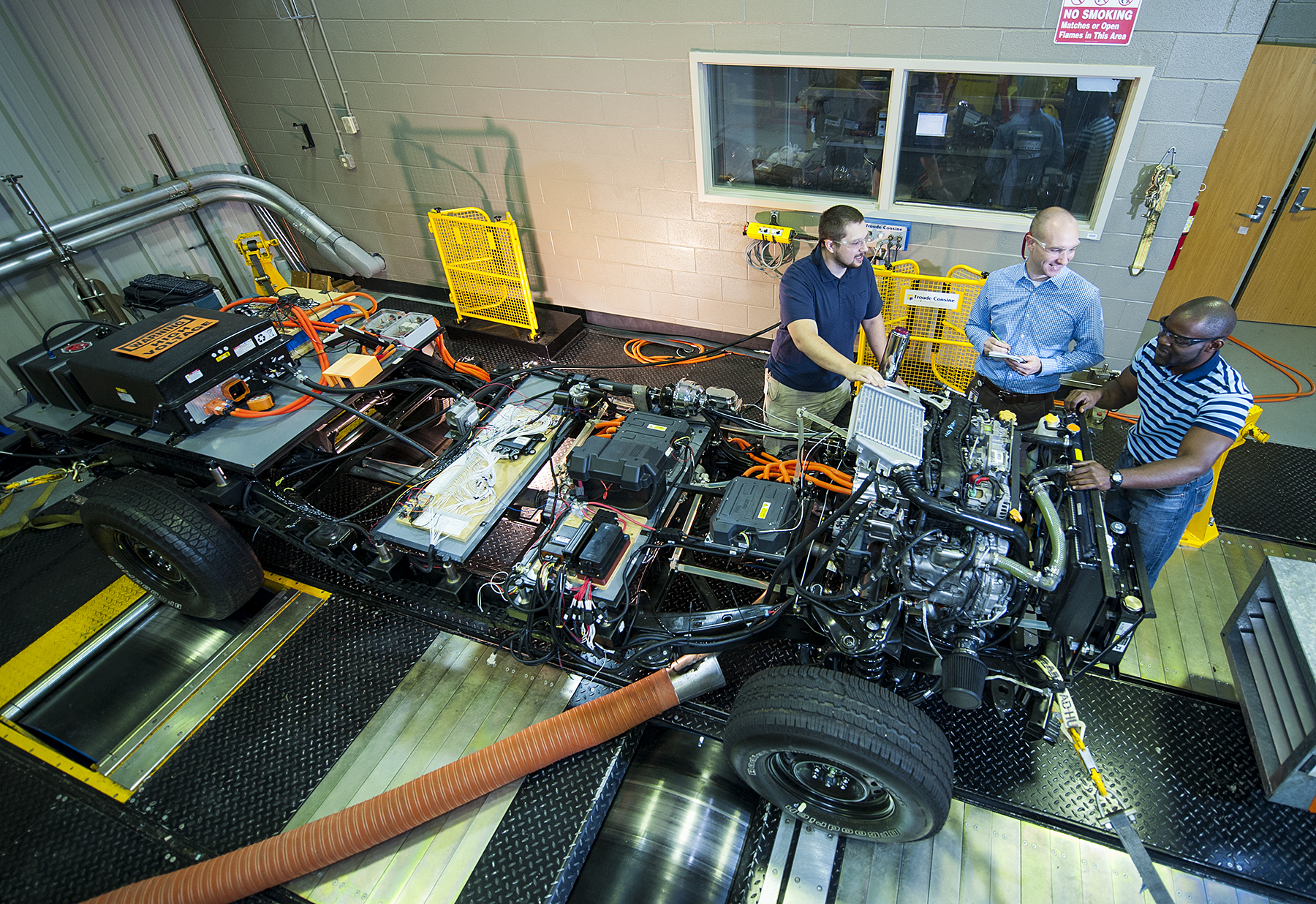Contact: Leah Barbour

Photo by: Russ Houston
STARKVILLE, Miss.--Driven to lead in vehicle performance and energy efficiency, Mississippi State University engineers are steering development of the "Car of the Future."
Though the vehicle may look like a typical crossover SUV, its engine will not be connected to the wheels like conventional automobiles. Instead, the engine will rotate a generator that charges an energy storage system which will provide power to two electric motors driving the rear wheels.
"Our focus here is trying to demonstrate Mississippi State's capabilities in developing advanced technology to enhance vehicle technology," said principal investigator Zach Rowland, deputy director of MSU's Center for Advanced Vehicular Systems. "The goal is to advance the technologies by developing the engineering technology and the engineers that will help promote and advance vehicle design."
The university team of faculty members, alumni and students hopes to have the hybrid vehicle operating by December.
More than a year ago, James Worth "Jim" Bagley, a 1961 and 1964 MSU electrical engineering alumnus and major university benefactor, presented his "Car of the Future" vision to researchers at the MSU's Center for Advanced Vehicular Systems, said team leader Matthew Doude, CAVS research associate.
Bagley, namesake of MSU's engineering college and the former CEO and board chairman of California-based Lam Research Corp., is funding the project. In a 2002 Mississippi State Alumnus article, he explained how, growing up, he rebuilt a 1949 Packard engine. The Forest Hill High School graduate from Jackson credited that experience for sparking his interest in economic, efficient vehicles.
Doude said Bagley's personal experience with vehicles underlies the project's parameters.
"Jim Bagley is driven by his own experiences," said Doude, an MSU graduate that earned mechanical engineering bachelor's and master's degrees in 2007 and 2014, respectively. "He drives every day like the rest of us, and he sees the opportunity for improvement in the way vehicles operate.
"He's the one that set these requirements for the project," Doude continued. "Bagley wanted a series hybrid which dictates the way we arrange the electric motors in the engine--an engine that is not connected to the wheels. He wanted automatic torque vectoring and for the battery to be as small and light as possible."
The vehicle's automatic torque vectoring will allow a computer to control which wheels are supplied with more torque as the vehicle goes around corners and curves. This feature creates significant performance advantages by improving the car's traction, said Will Dickerson, a 2012 MSU graduate who recently left his automotive industry job in Detroit to return to CAVS and work on the project.
Doude emphasized the purpose of the Car of the Future project is to demonstrate how improved energy systems can make vehicles more affordable and more efficient. Also, lighter batteries result in lighter vehicles, and optimized energy storage enables the recapture of energy normally lost.
Regenerative braking will be another feature of the car, Dickerson said. Energy normally lost in the brakes as heat will be secured in the battery to be used again to accelerate the vehicle and further improve the vehicle's efficiency.
In addition to the primary mission of developing a more efficient vehicle, the team is working to expand the educational opportunities for new students and generate more center projects, Doude said. Since CAVS regularly works with companies interested in the development of new products, successfully developing the Car of the Future should result in more automotive engineering projects.
"Another goal for the university is to take all the knowledge that we've gained from the EcoCAR competitions and other parts of CAVS and display that we can take all those concepts and put them on the road," Dickerson said. "This project enables us to consolidate our past experiences and current resources, and it will let us display Mississippi State's capabilities to the world."
Both as students and graduates, Dickerson and Doude participated in EcoCAR, the selective automotive-engineering competition sponsored by the U.S. Department of Energy and General Motors. For the fourth consecutive time, MSU was one of only 16 higher education institutions invited to participate in the advanced vehicle technology challenge during the fall semester.
"EcoCAR has laid the foundation for all this type of work at CAVS in terms of bringing in the equipment, training the students, and CAVS building its reputation in doing this kind of work," Doude explained. "We have other vehicle projects that I am involved with, but EcoCAR is what got me started on this road."
The Car of the Future project is showing the automotive industry that MSU is shaping the future of vehicle engineering, Dickerson said.
"Mississippi State is producing students that are going on to work in all parts of the automotive industry, and we're doing that same work here at CAVS and helping to shape what automotive technology and products are going to look like in the future," he said.
Learn more about CAVS www.cavs.msstate.edu.
See www.msstate.edu to discover more about MSU. Visit facebook.com/msstate, twitter.com/msstate or instagram.com/msstate to join the conversation, or search "Mississippi State University" to connect on www.linkedin.com.